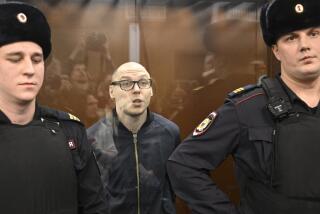Soviets Honor Folk Singer--6 Years After Death
- Share via
MOSCOW — The Soviet Union has taken the first step to give its official blessing to the late Vladimir Vysotsky, a legendary folk singer who rarely received such approval during his lifetime.
Vysotsky, who became a cult figure after his death six years ago at the age of 42, wrote and sang about harsh, everyday reality with mordant wit. He gave hundreds of informal concerts but cautious state officials never allowed him to perform his most popular songs on television or have them recorded.
Instead, his husky baritone circulated on an electronic version of samizdat-- unofficial or clandestine publications--or in this case, amateur recordings taped by his avid fans.
This week, however, the Union of Writers announced that a commission on Vysotsky’s literary heritage has been created and is looking for letters, documents and photographs about his life and work. The announcement was carried by the official news agency Tass but was not immediately carried by major national newspapers.
Party Cashing In
Western observers interpreted the creation of the commission as a move by the party to cash in on Vysotsky’s continuing popularity. After all, they said, Soviet leader Mikhail S. Gorbachev has made self-criticism an article of faith, and Vysotsky’s verses could be regarded as holy writ rather than heresy now.
“They are trying to co-opt him, take him over,” said one Western diplomat familiar with Vysotsky’s work.
It was not clear whether the mention of the folk singer’s literary heritage meant that more of his songs would be published or issued as records by state-run agencies.
A leading poet, Robert Rozhdestvensky, was named chairman of the commission, which includes some close associates of Vysotsky who had their own literary disputes with the authorities.
Controversial Lyrics
Among those named to the panel were Bella Akhmadulana, a poet, and Bulat Okudzhava, another composer of folk songs who ran into trouble with the Communist Party because of his outspoken lyrics.
Vysotsky’s widow, Marina Vlady, a French actress of Russian ancestry, and his father, Semyon Vysotsky, also were appointed to the commission. In addition, there were more orthodox panelists from the artistic world, including actors, theatrical directors and other literary figures.
Vysotsky worked for more than 15 years as an actor at the Taganka Theater when Yuri Lyubimov, who has since defected to the West, was its highly praised chief director.
Akhmadulana once said of Vysotsky: “He wrote about the grimy, gritty, poignant things that are not supposed to exist in our society but that people live by. . . . People have a profound hunger to be told about things as they are.”
Another admirer put it more simply, saying: “He was simply saying that life here is often very hard. For a Russian, this is a wonderful thing to hear.”
Difficult to Translate
Vysotsky’s verses are not easily translated into English since they play on Russian words and often have double or triple meanings. But he wrote about the ravages of vodka long before the current official anti-alcohol campaign and commented acidly on the frustrations of air travel, the dullness of Soviet television, the laments of labor camp inmates.
Despite his underdog viewpoint, Vysotsky was far from a dissident. He had a spacious apartment, drove a Mercedes and occasionally was allowed the rare privilege of travel to the West. He made a brief concert tour to the United States in 1979.
Very Few Recorded
Yet of his 600 or more songs, only a few dozen were recorded and he never was allowed to appear in a major concert hall in the Soviet Union.
More to Read
Sign up for Essential California
The most important California stories and recommendations in your inbox every morning.
You may occasionally receive promotional content from the Los Angeles Times.













